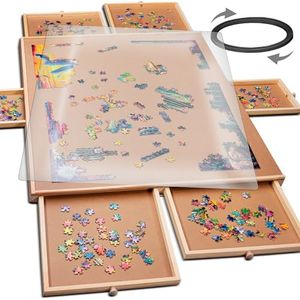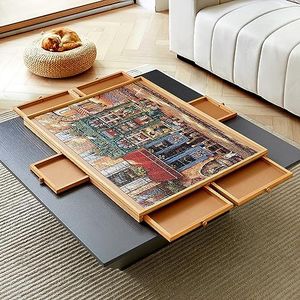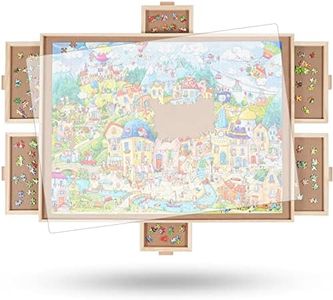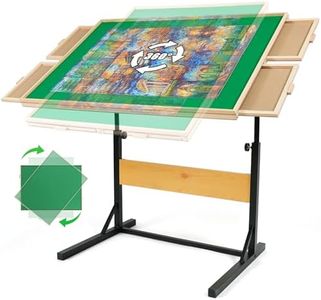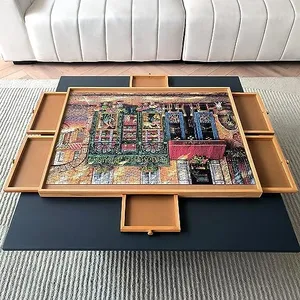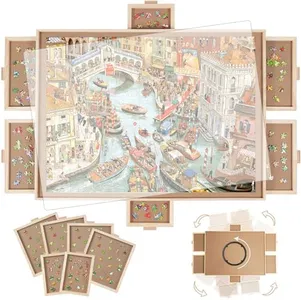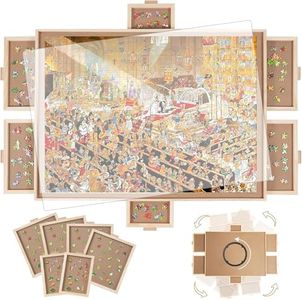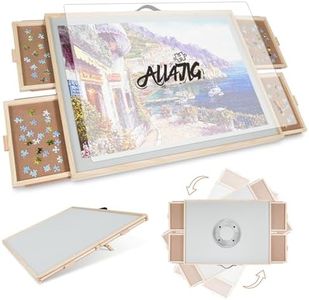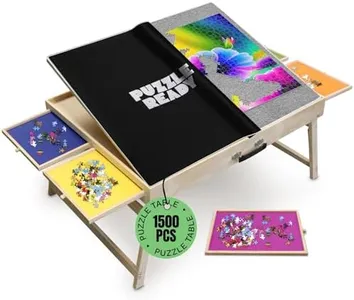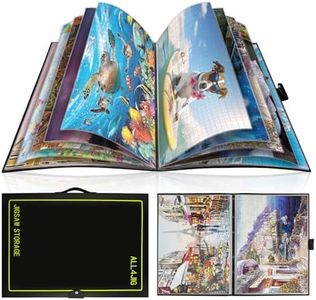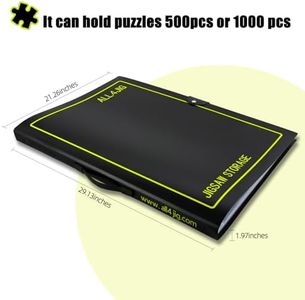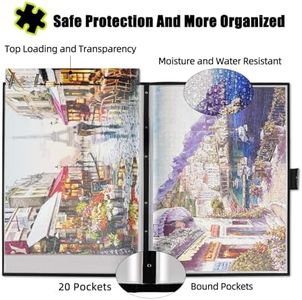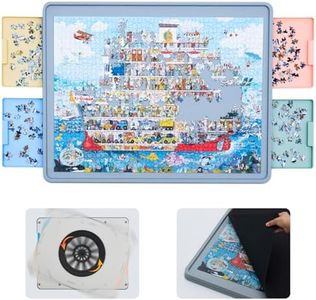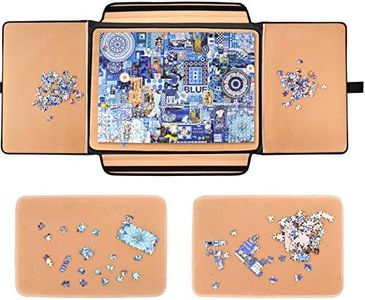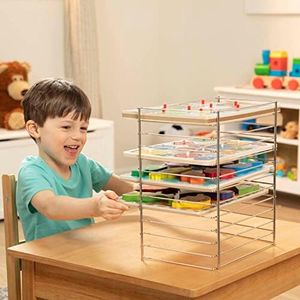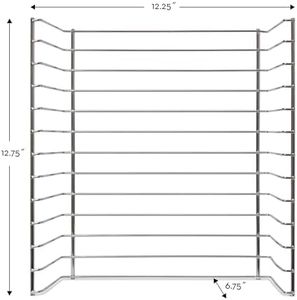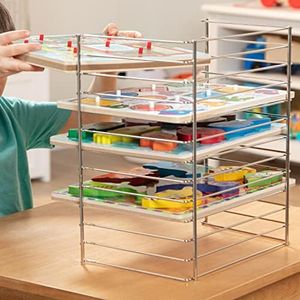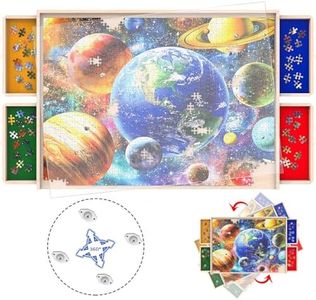10 Best Puzzle Organizer 2025 in the United States
Winner
PlayVibe Puzzle Locker 1500 Piece Puzzle Board with Drawers and Cover - Sturdy Jigsaw Table Solve Station with 6 Drawers 27" x 35" - Portable Wooden Jigsaw Tray Accessories
The PlayVibe Puzzle Locker is a solid choice for puzzle enthusiasts looking for a convenient and organized way to assemble their favorite jigsaw puzzles. With a spacious surface accommodating up to 1500 pieces, this puzzle board offers a sturdy base, allowing you to move your work-in-progress without the worry of pieces falling apart. This is a significant strength, especially for those who appreciate a stable environment while puzzling.
Most important from
10752 reviews
ENERIDIO Wooden Puzzle Table with 6 Drawers and Cover, Adult Portable Puzzle Board, 34 "x 26" Jigsaw Puzzle Table, Used for Puzzle Storage and Sorting, can Hold 1500 Pieces
The ENERIDIO Wooden Puzzle Table with 6 Drawers and Cover is a solid choice for puzzle enthusiasts. The table's size, 34x26 inches, is perfect for most 1500-piece puzzles, providing ample space to work on your puzzle comfortably. The six drawers are a notable feature, allowing you to sort puzzle pieces by shape or color, which can make the puzzle-solving process more organized and enjoyable. Additionally, the translucent cover helps protect your puzzle from dust, water, and pets, so you don't have to worry about your progress being disturbed when you take a break.
Most important from
975 reviews
ALL4JIG 1500 Pieces Rotating Puzzle Board with 6 Drawers and Cover,26"x35"Portable Wooden Jigsaw Puzzle Table for Adults,Lazy Susan Spinning Puzzle Boards Birthday Gift for mom
The ALL4JIG 1500 Pieces Rotating Puzzle Board is an excellent choice for puzzle enthusiasts looking for a convenient way to organize and assemble their jigsaws. The board is made from high-quality, sustainable hardwood, ensuring durability and a smooth surface for puzzle assembly. Its size (26"x35") is suitable for most jigsaw puzzles, accommodating up to 1500 pieces.
Most important from
1148 reviews
Top 10 Best Puzzle Organizer 2025 in the United States
Winner
9.8 score
PlayVibe Puzzle Locker 1500 Piece Puzzle Board with Drawers and Cover - Sturdy Jigsaw Table Solve Station with 6 Drawers 27" x 35" - Portable Wooden Jigsaw Tray Accessories
PlayVibe Puzzle Locker 1500 Piece Puzzle Board with Drawers and Cover - Sturdy Jigsaw Table Solve Station with 6 Drawers 27" x 35" - Portable Wooden Jigsaw Tray Accessories
Chosen by 1369 this week
ENERIDIO Wooden Puzzle Table with 6 Drawers and Cover, Adult Portable Puzzle Board, 34 "x 26" Jigsaw Puzzle Table, Used for Puzzle Storage and Sorting, can Hold 1500 Pieces
ENERIDIO Wooden Puzzle Table with 6 Drawers and Cover, Adult Portable Puzzle Board, 34 "x 26" Jigsaw Puzzle Table, Used for Puzzle Storage and Sorting, can Hold 1500 Pieces
ALL4JIG 1500 Pieces Rotating Puzzle Board with 6 Drawers and Cover,26"x35"Portable Wooden Jigsaw Puzzle Table for Adults,Lazy Susan Spinning Puzzle Boards Birthday Gift for mom
ALL4JIG 1500 Pieces Rotating Puzzle Board with 6 Drawers and Cover,26"x35"Portable Wooden Jigsaw Puzzle Table for Adults,Lazy Susan Spinning Puzzle Boards Birthday Gift for mom
BuilderButler 1500 Pieces Rotating Puzzle Board with 6 Drawers,26"x35" Portable Wooden Jigsaw Puzzle Table with Lazy Susan Spinning Cover
BuilderButler 1500 Pieces Rotating Puzzle Board with 6 Drawers,26"x35" Portable Wooden Jigsaw Puzzle Table with Lazy Susan Spinning Cover
BuilderButler 1000 Pieces Rotating Puzzle Board with 6 Drawers,30.9"x23.2" Portable Wooden Jigsaw Puzzle Table with Lazy Susan Spinning Cover
BuilderButler 1000 Pieces Rotating Puzzle Board with 6 Drawers,30.9"x23.2" Portable Wooden Jigsaw Puzzle Table with Lazy Susan Spinning Cover
ALL4JIG Puzzle Storage Folder Keeper for Jigsaw Enthusiasts Puzzle Space-Saving Organizer Accessories for Adults Holds 20 Puzzles, HD Film Pockets
ALL4JIG Puzzle Storage Folder Keeper for Jigsaw Enthusiasts Puzzle Space-Saving Organizer Accessories for Adults Holds 20 Puzzles, HD Film Pockets
WELGEE Rotating Puzzle Board for 1500 Pieces with Drawers and Cover | Upgraded Lazy Susan Spinning Jigsaw Puzzle Organizer Table (35"x27") | Durable ABS Plastic, Ideal Gift for Mum
WELGEE Rotating Puzzle Board for 1500 Pieces with Drawers and Cover | Upgraded Lazy Susan Spinning Jigsaw Puzzle Organizer Table (35"x27") | Durable ABS Plastic, Ideal Gift for Mum
1500 Pieces Jigsaw Puzzle Board, Portable Puzzle Board, Jigsaw Puzzle Table Board, Puzzle Keeper Puzzle Caddy with Sorting Trays & Detachable Board,Non-Slip Surface
1500 Pieces Jigsaw Puzzle Board, Portable Puzzle Board, Jigsaw Puzzle Table Board, Puzzle Keeper Puzzle Caddy with Sorting Trays & Detachable Board,Non-Slip Surface
7.4 score
Puzzle Board with Drawers Rotatable 360-Degree Wheels and Cover 30'' x 22'' 1000 Piece Wooden Jigsaw Puzzle Table Puzzle Storage Organizer Portable Lightweight Design (No Lazy Susan)
Puzzle Board with Drawers Rotatable 360-Degree Wheels and Cover 30'' x 22'' 1000 Piece Wooden Jigsaw Puzzle Table Puzzle Storage Organizer Portable Lightweight Design (No Lazy Susan)
Our technology thoroughly searches through the online shopping world, reviewing hundreds of sites. We then process and analyze this information, updating in real-time to bring you the latest top-rated products. This way, you always get the best and most current options available.

